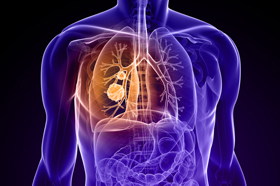New Research Shows How Some Cancers Develop Resistance to Drugs
 A new study has given scientists their first look at the genomic landscape of tumors that have grown resistant to drugs targeting the abnormal KRASG12C protein. Researchers discovered there are multiple acquired resistance mechanisms for cancers with KRASG12C mutation after treatment with RASG12C inhibitors. Their work shows that, far from adopting a common route to becoming resistant, the cells take a strikingly diverse set of avenues, often several at a time.
A new study has given scientists their first look at the genomic landscape of tumors that have grown resistant to drugs targeting the abnormal KRASG12C protein. Researchers discovered there are multiple acquired resistance mechanisms for cancers with KRASG12C mutation after treatment with RASG12C inhibitors. Their work shows that, far from adopting a common route to becoming resistant, the cells take a strikingly diverse set of avenues, often several at a time.
The study by Dana-Farber Cancer Institute researchers was reported online in the New England Journal of Medicine. It underscores the need for new drugs that inhibit KRAS differently than current agents do. And, because resistance can arise through many different mechanisms, effective treatment for these cancers will likely require combinations of KRAS inhibitors and other targeted drugs.
“Mutations in the KRAS gene are fairly common across cancer types,” said Dana-Farber’s Mark Awad, MD, PhD, the co-first author of the paper with Shengwu Liu, PhD, also of Dana-Farber. “The particular mutation we focused on in this study, KRASG12C, is found in about 13% of non-small cell lung cancers [NSCLC], where it’s often associated with tobacco use, in up to 3% of colorectal cancers, and less frequently in a range of other cancers. While no targeted therapy has been approved for this specific molecular subtype, two inhibitors of the KRASG12C protein – adagrasib and sotorasib – have shown promise in clinical trials, especially in patients with NSCLC.”
“While results from these early clinical trials are encouraging, the cancer usually becomes resistant to these drugs,” Awad continued. “The mechanisms of resistance – the genomic and other changes that occur that allow the cancer to begin growing again – are largely unknown. This study sought to identify them.”
The study results point to the variety of ways cancers with KRASG12C mutations can overcome the effects of adagrasib, the authors say. “Cancers with the KRASG12C mutation constitute a large proportion of all lung cancers, and many pharmaceutical companies are developing KRASG12C inhibitors,” Awad observed. “The hope is that studies such as this, which uncover resistance mechanisms, will help drive future studies of combination therapies to delay or prevent resistance or overcome it when it occurs.”